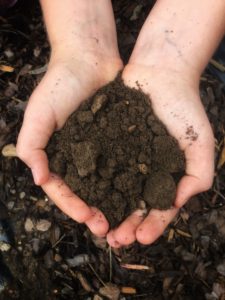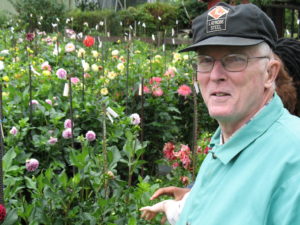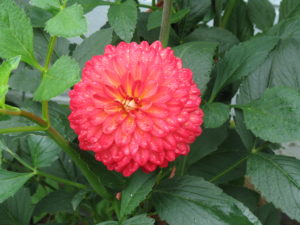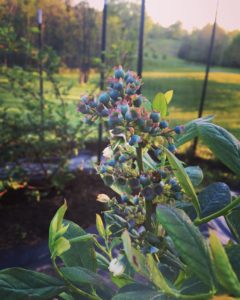
A few years ago, Brenda told me about a free service offered at our local agricultural extension office. If you take them a few cups of soil, they will test it and offer recommendations to improve it. To be honest, I’ve hesitated doing it. For some reason, I’ve envisioned being told: “Your soil is so bad. I mean… really bad. In fact, it’s one of the worst we’ve ever tested. It’s obvious that you don’t know what you’re doing. Hand over your shovel now.” Yes, I know it’s silly. They’re there to help! At the same time, handing my soil over to this process requires a level of humility that acknowledges my limitations. I don’t know everything. But if I want to get better, I’m going to need help from people who are more seasoned than I am.
Back in April, I took a bite of humble pie and walked my soil into the extension office. They told me it would be a few weeks before I would get the report. A couple of days later, I received a call asking about my gardening plans. We talked about my existing berry plants as well as my plans for this season’s vegetables. They thanked me and would send the results and recommendations within two weeks.
During those two weeks, my curiosity grew about their testing process. I turned to google. It didn’t take long to become overwhelmed by the unending supply of information available. Those who read my last post will remember my discussion about pH and blueberries. Let me just say, while pH is very important, there is so much more to developing and maintaining good soil than I realized. Healthy soil is measured by various factors; nutrient content, mineral levels, structure, texture, and the existence of micro-organisms just to name a few! The University of Oklahoma described the benefits of soil testing: “(It) increases productivity by identifying soil nutrients or soil chemical factors that are limiting plant growth, increases fertilizer use efficiency by indicating appropriate rates for different soils and crops, protects the environment by preventing over fertilization, (and) identifies polluted or contaminated soils.” Who knew soil could be so complex?
As I waded through the information, I began to focus on finding ways to improve the soil. In our area, clay tends to be a dominant component. From what I gathered, improving the soil requires identifying it’s texture and structure. Soil texture is made up of a unique blend of sand, silt, and clay. These three components become the foundation for various categories and classifications depending on the amount of each component. In fact, the USDA has 12 classifications of soil texture. Horticulturalist use these classifications to help growers understand the current state of their soil and what it’s useful for. It’s one of the major reasons some regions of the world grow things better than others.
I’m going to let you in on a little secret. One of the things I miss about Canada is the access we had to amazing fruits and vegetables. There is the area around the great lakes called the Niagara Peninsula. It has some of the richest soil for food production. It is a perfect blend of sand, silt, and clay. If you were to travel that area, you could drive through miles of farms and vineyards. Along the way, you may choose to stop at a family owned fruit stand to buy peaches or berries. But if I were craving potatoes, I’d have to say the best ones grow in Prince Edward Island (P.E.I). The soil texture and mineral makeup in P.E.I. is known for growing some of the best tasting potatoes. I’ll never forget visiting my Aunt and Uncle after being away for several years. They served us steak and boiled potatoes. I have to laugh as I think back to it. In the face of an expensive grilled steak, all I could do was rave about the boiled potatoes! “Oh my word! What did you put in these? They’re amazing!” My Aunt looked at me with her trademarked sarcastic grin: “uh… Potatoes?” Let me just say, these beauties don’t need the “Southern” hospitality of a pound of butter. They’re amazing all by themselves. Recently, I discovered that Whole Foods will occasionally import some fresh produce from Canada. I am not ashamed to admit that I have driven 50 minutes for Canadian potatoes!
 Those looking to improve their soil need to understand that it doesn’t happen overnight. Change is gradual. When it comes to making improvements, you need to understand the current state of your soil before developing a plan to alter it. Once you know the texture, you can begin to focus on changing its structure. Soil structure refers to the way these textured particles (sand, silt & clay) are held together into what is called “aggregates.” Aggregates are bonded clumps of particles that allow space and pores throughout the soil for water to enter and roots systems to grow. Particle bonding is key in order to provide an optimal blend of movement and stability for plant roots to take hold. If soil has too much clay, it will crust on the surface and prevent the infiltration of water. If it’s too loose, the soil will fail to hold adequate moisture and will struggle to hold a plant in place. My father-in-law understood this well. He was known for his award winning dahlias. Over the years, he focused on improving the soil and produced some of the best flowers in the region. The year he passed, we went to visit my mother in law and were surprised to see the magnificent pepper plant she had growing in the backyard. I had never seen one so large and full of peppers! Looking back, it was evident that he had left a legacy of beautifully rich soil for us to enjoy.
Those looking to improve their soil need to understand that it doesn’t happen overnight. Change is gradual. When it comes to making improvements, you need to understand the current state of your soil before developing a plan to alter it. Once you know the texture, you can begin to focus on changing its structure. Soil structure refers to the way these textured particles (sand, silt & clay) are held together into what is called “aggregates.” Aggregates are bonded clumps of particles that allow space and pores throughout the soil for water to enter and roots systems to grow. Particle bonding is key in order to provide an optimal blend of movement and stability for plant roots to take hold. If soil has too much clay, it will crust on the surface and prevent the infiltration of water. If it’s too loose, the soil will fail to hold adequate moisture and will struggle to hold a plant in place. My father-in-law understood this well. He was known for his award winning dahlias. Over the years, he focused on improving the soil and produced some of the best flowers in the region. The year he passed, we went to visit my mother in law and were surprised to see the magnificent pepper plant she had growing in the backyard. I had never seen one so large and full of peppers! Looking back, it was evident that he had left a legacy of beautifully rich soil for us to enjoy.
Each year, experienced gardeners will work to make improvements by adding nutrients, fertilizer, and compost. Compost is a mixture of organic matter (coffee grinds, egg shells and other bio-degradable food scraps), decaying vegetation (mulch, leaves & grass clippings) and well-rotted manure. Compost aids the soil to build healthy aggregates and improve fertility. Recently, I read an article raving about the benefits of manure in the garden. A friend and I had been talking about it and heard that our local university equine program was giving manure away to those willing to scoop it themselves. Imagine that – free poop! Let me pause here for moment to offer a friendly warning. If you were reading carefully, you probably noticed the phrase, “well-rotted manure.” Please, please, please… do not venture out to gather “fresh” horse or cow “droppings,” dump it on your garden, and expect things to go well. It won’t. If the stench and bugs aren’t enough to deter you, please understand that it could do damage to an existing or soon to be planted garden. “Fresh” or “raw” manure is too “hot” for a field ready to be planted. Manure must be aged and cultivated with decaying matter such as leaves and mulch in order to benefit your soil. “Raw” manure will burn young plants and increase your soil’s bacteria level putting you at risk for illnesses such as salmonella. It is most likely the reason for this year’s major lettuce recall. If you are just starting out, cured compost is readily available at your local hardware store and greenhouse. You can purchase it by the bag. We have a supplier we use who produces it on a mass scale and sells it by the “scoop.” For those of you who have the time and space, you can read about developing your own composting system. It’s important to remember that good compost needs more than food scraps in order to useful!
You can only imagine the amount of spiritual application that came from what I’ve just shared. There is so much here I could talk about! Let me share a few thoughts.
My brief research into soil aggregates reminded me of a key element God uses in cultivating our souls. Throughout creation, God weaved the need for relationship. He is relational to the core. Even down to the soil beneath our feet, God uses the relationship between different soil textures to nourish and stabilize what is being grown! Time and time again, God continues to speak to my heart about the power of connection. I’ve probably worn my friends over the years talking about it! We were never meant to be an island unto ourselves. I promise you, the “just me and Jesus” theology will leave you void of joy and spiritual dimension. When we take time to develop real relationships in mutual submission and vulnerability, God will use them to soften our hearts in order to see the fruits of the Kingdom. I’m sure I will share more on this in a future post!
When looking at compost – we need to remember that no one is exempt from dealing with “the manure” of life. While it’s true that God will use it for His benefit, too often we want to rush the process, failing to recognize how “fresh” it is. Attempting to use our suffering and pain before God has brought healing and interpretation is not beneficial. In fact, it can be downright harmful! There is something powerful that happens when we let it sit before God. Coupled with some decay – a little “death to our flesh” in all its pride and selfishness – we can allow God to walk us through our hurt and use it for His glory. We can never underestimate the power of waiting. Looking back at my story, there were many times I wish I had walked away before reacting to a “fresh” situation. It was too “hot” to deal with and my defensiveness made it stink! I’m sure you’ve watched people in your life who have burned up relationships, careers, and ministries simply because they didn’t know how to pause and deal with their pain or ungodly motivation.
 Let me end with the most important lesson I learned in this process. It happened the day I walked my soil into the extension office for testing. I felt God beginning to prompt my heart as I handed it to the receptionist: “Humility is the first step in improving your soil.” In the same way, humility is needed when approaching God about the state of our soul. It’s telling God, “I don’t know everything! I need You to help me see what’s really going on beneath the surface.” We are complex beings who have been heavily influenced by various internal and external elements. Some of us have rich histories with families strong in love and faith. Our experiences in the world leave us believing anything is possible. Others of us have struggled to overcome abuse, toxic relationships, and negative family patterns. Some of us may have even faced the uphill climb brought about by our community, socio-economic status, gender, and/or race. These elements along with our personality, strengths, and weaknesses, create a unique internal framework from which we interpret life. Unfortunately, many of us live our lives ignorant as to how our internal framework impacts our walk with God and others. If we choose to remain unaware of the current state of our soul, we are likely to become derailed when things are failing to flourish. I can’t tell you how many times my husband and I have sat across the table from people who have gotten stuck in their spiritual journey due to their lack of self-awareness. They have no idea why they are struggling to hear God and fail to understand the impact they have had on those around them.
Let me end with the most important lesson I learned in this process. It happened the day I walked my soil into the extension office for testing. I felt God beginning to prompt my heart as I handed it to the receptionist: “Humility is the first step in improving your soil.” In the same way, humility is needed when approaching God about the state of our soul. It’s telling God, “I don’t know everything! I need You to help me see what’s really going on beneath the surface.” We are complex beings who have been heavily influenced by various internal and external elements. Some of us have rich histories with families strong in love and faith. Our experiences in the world leave us believing anything is possible. Others of us have struggled to overcome abuse, toxic relationships, and negative family patterns. Some of us may have even faced the uphill climb brought about by our community, socio-economic status, gender, and/or race. These elements along with our personality, strengths, and weaknesses, create a unique internal framework from which we interpret life. Unfortunately, many of us live our lives ignorant as to how our internal framework impacts our walk with God and others. If we choose to remain unaware of the current state of our soul, we are likely to become derailed when things are failing to flourish. I can’t tell you how many times my husband and I have sat across the table from people who have gotten stuck in their spiritual journey due to their lack of self-awareness. They have no idea why they are struggling to hear God and fail to understand the impact they have had on those around them.
The beautiful hope we have in Christ, is that our past and present don’t have to define our future! When we stop and invite the Lord to assess the current state of our soul, we position our hearts to pray as David did:
“God, I invite your searching gaze into my heart.
Examine me through and through;
find out everything that may be hidden within me.
Put me to the test and sift through all my anxious cares.
See if there is any path of pain I’m walking on,
and lead me back to your glorious, everlasting ways—
the path that brings me back to you.” – Psalms 139:23-24
God made us and He sees it all! He knows the motivation of our hearts. He understands how our past and present have impacted our mind, will, and emotions. He knows the broken and shattered places no one else sees. He’s not surprised when we overreact or lash out. He knows why we can’t let go in our demand for justice. He sees every anxious thought along with our longing to run and hide. He is fully aware of how we’ve traded His inheritance of restoration for moments of relief and pleasure. But just like the Father in the story of the prodigal son, He longs for our return! His arms are open wide to receive us every moment of every day.
 I’ve spent the last few years gathering questions from various writers meant to push into my soul. I long for my heart to be the fertile ground for God’s seeds to grow. I’ll be honest – it’s not easy. It takes time and persistence. A careful examination of the heart does not come on the heels of a fast paced life. And it certainly does not reach fulfillment without a partnership with one who created it. You will never reach true restoration on your own! Not long ago, a dear friend of mine challenged several of us with this question: “What if we were willing to exchange our auto-piloted reactions and reliance on behavioral strategies for something more? What if we traded our self-contempt for curiosity?” In other words, what would it look like if we stopped beating ourselves up for our failings and started asking God the deeper questions? As I end this entry, I’ve posted a few questions I felt the Lord prompt me to ask. I hope one or two might lead you to a time of contemplation with Him.
I’ve spent the last few years gathering questions from various writers meant to push into my soul. I long for my heart to be the fertile ground for God’s seeds to grow. I’ll be honest – it’s not easy. It takes time and persistence. A careful examination of the heart does not come on the heels of a fast paced life. And it certainly does not reach fulfillment without a partnership with one who created it. You will never reach true restoration on your own! Not long ago, a dear friend of mine challenged several of us with this question: “What if we were willing to exchange our auto-piloted reactions and reliance on behavioral strategies for something more? What if we traded our self-contempt for curiosity?” In other words, what would it look like if we stopped beating ourselves up for our failings and started asking God the deeper questions? As I end this entry, I’ve posted a few questions I felt the Lord prompt me to ask. I hope one or two might lead you to a time of contemplation with Him.
Where does my heart go when I feel overwhelmed or inadequate?
Why do I lash out in anger when things don’t go well?
Why am I so focused on being right or having the right answer?
Where does this guilt come from when I tell people “no?”
Why does that person always seem to get under my skin?
Is there a reason I’m guarded and hold my emotions in?
What is it like to spend a 9 hour car ride with me? What would those people say about the quality of love I offer them?
What am I really feeling when I turn to movies, food, or pornography after a rough day or argument with my spouse?
Why am I defensive when a friend, coworker or boss approaches me about a mistake I’ve made?
Why do pull away from people when I’m hurting?
Beautiful. Deep. Rich!!! Timely, as I am “feeling” in this very moment I just missed the mark…said something I have been praying I wouldn’t and asking Abba what He thinks about all of this…what He things about me?!…
A reaction from being caught off guard about a question that was surface level to the asker but to the hearer struck a massive blow to a currently bleeding and un-healed fresh path of pain.
Jesus, your everlasting ways. Come!
Thank you for all the hard heart work you continue to do, Aimee. You are a blessing to so many. 💕 I will meditate on His Words through you for some time to come.
Me, too! Your blog, once again, affirms …we are the church, relational, vulnerable & on this incredible journey together for which I am eternally grateful to Jesus & you. Wonderful expression Aimee.
I love you Kathryn!!
Thank you for sharing that! It’s so good to know that what God is saying, it’s saying to many. I love you!
This is so good! Thank you so much for your wisdom and depth of heart for God! You always open the door to such wonderful conversations with the Father. The conversation opened up was how He created us from the clay(dirt) and what we are nourished with and made up of matters too and affects the soil of our heart and how we grow and receive nutrients. This is a deep well that I’ve only begun talking with Him about but oh how beautiful and I love where He is going with this ❤️
Thanks so much Lashay! You have blessed me beyond measure!